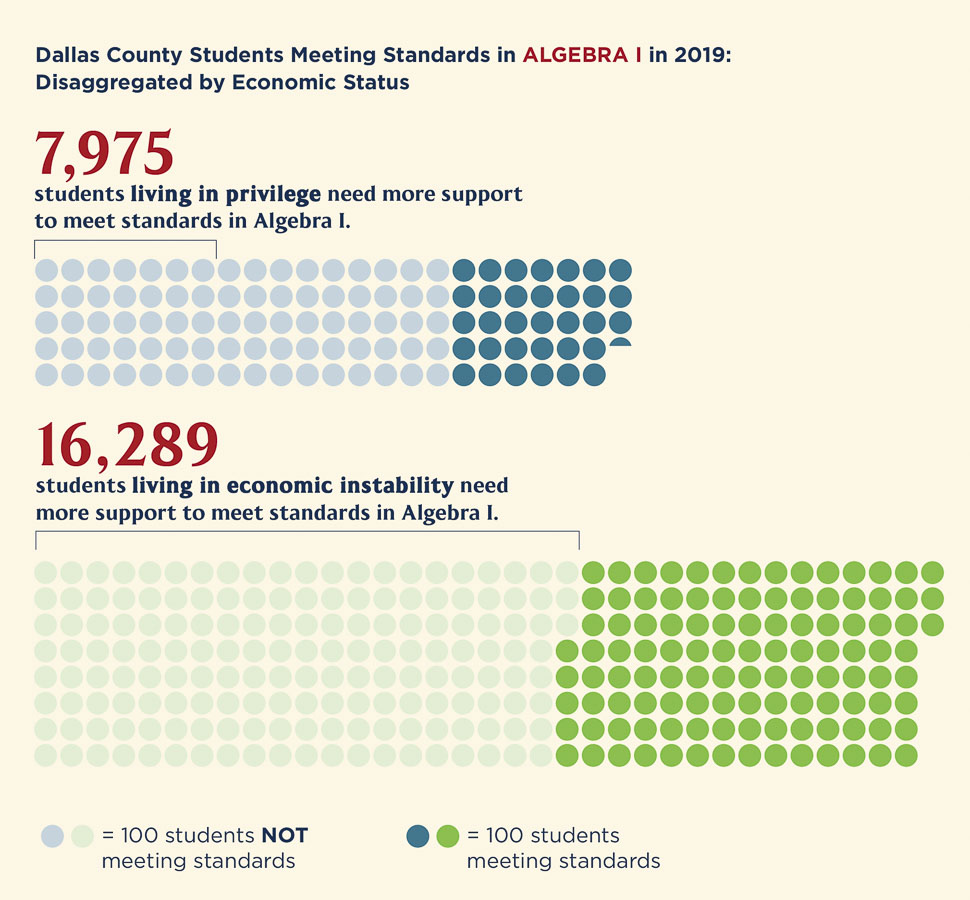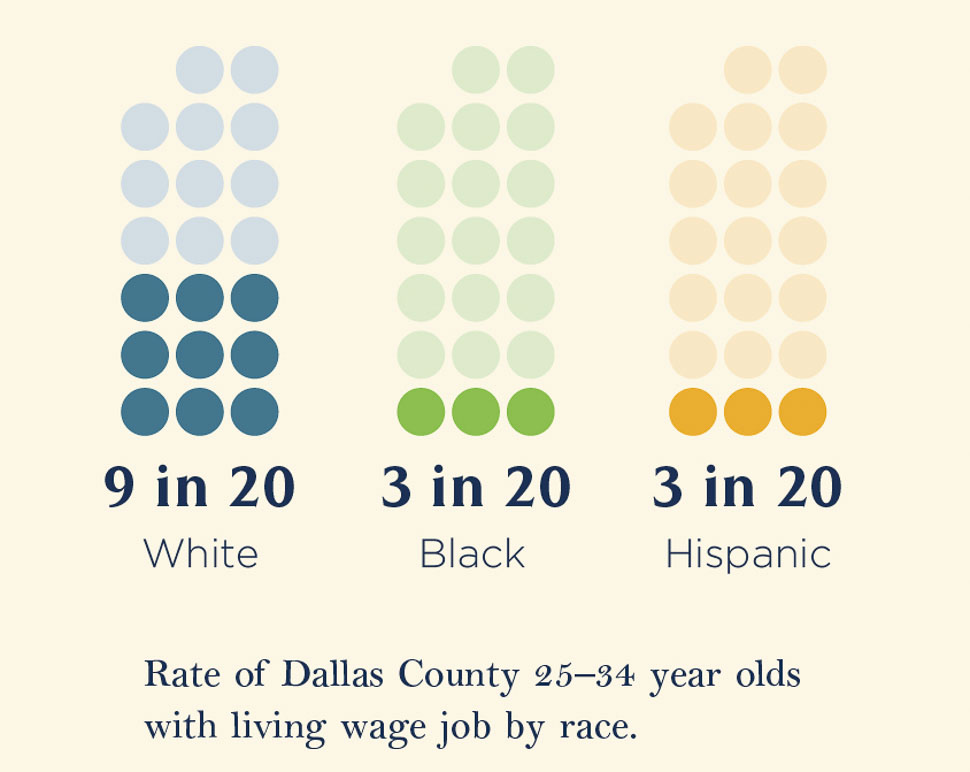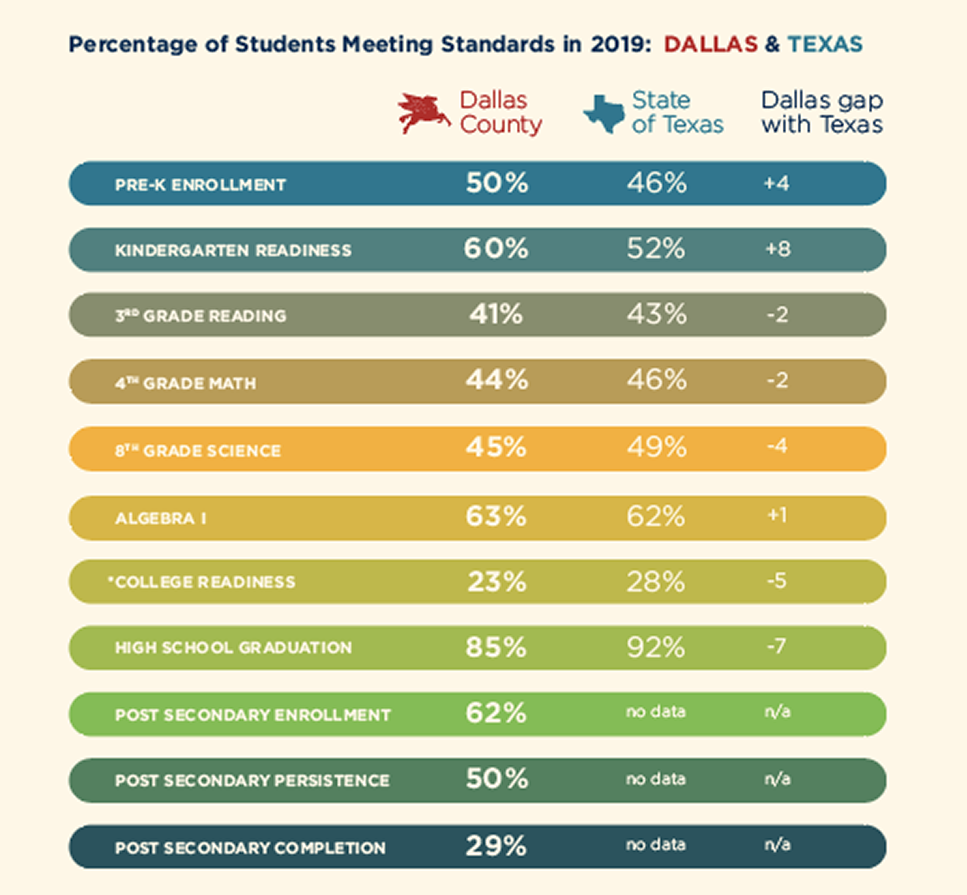Dallas is the least inclusive city in America, according to The Commit Partnership. It’s hard to hear, the nonprofit notes—but it’s even harder to ignore.
That’s a driving factor behind Commit’s work to ensure all North Texas students receive a quality and equitable education that prepares them for a successful professional future. Together with more than 200 partners, the Commit team works to solve the region’s biggest systemic challenges, making it the largest collective impact organization in the nation.
Each year, to track progress being made in public education and evaluate the overall health of Dallas’ cradle-to-career pipeline, Commit releases a Dallas County Scorecard. From there, the intent is to put community actions in place that can address the largest gaps in opportunity that are affecting student achievement.
Published this month is the 2019 rendition, which measures eleven key educational indicators for early childhood through post-secondary completion from February 2019 to February 2020.

[Image: Commit Partnership]
According to The Commit Partnership, the 2019 Dallas County Scorecard includes some stark data. In regard to educational inequity and how it relates to workforce inequity, the data further proved that students don’t attend school in a vacuum.
Commit saw that the city’s most concentrated areas of poverty, food insecurity, housing instability, toxic stress, and trauma can all affect a child’s ability to improve.
“Our educational outcomes, upon which our entire economy is reliant, are the result of a constellation of issues that have to be attacked holistically and systemically if we want to succeed,” Commit President Dottie Smith wrote in the Scorecard introduction. “Moreover, we know that arbitrary distinctions between cities and school districts don’t mean nearly as much to our students and parents as the ability to receive an excellent and equitable education that leads to success in college and career.”
The 11 indicators are: Pre-K enrollment, Kindergarten readiness, 3rd grade reading, 4th grade math, 8th grade science, algebra 1, college readiness, high school graduation, postsecondary enrollment, postsecondary persistence, and postsecondary completion.
But this year, the Commit team decided to more closely examine educational outcomes by race, socioeconomic status, and English language ability. That resulted in another indicator.

[Photo: Commit Partnership]
“Now, with our board and partners, we’ve elected to add a 12th indicator surrounding living wage attainment because we know that the inequity we see in our student data doesn’t disappear when they leave the classroom and enter the workforce,” Todd Williams, chairman and CEO of The Commit Partnership, said in a statement. “Creating an inclusive, equitable and prosperous region where race, place and socioeconomic status no longer predicts educational and economic attainment should be the goal of every person living in Dallas County.”
Data is provided by the Texas Education Agency; postsecondary enrollment, postsecondary persistence, and postsecondary completion data is provided by each school district.
For each, Commit looks at the percentage of students who are meeting the standards in Dallas and Texas. For instance, 41 percent of Dallas County students last year answered at least 76 percent of questions correct on the STAAR test. And, only 23 percent of Dallas County students meet the standards for college readiness, which means they scored at or above 1010 on the SAT or 23 on the ACT.
A key statistic from the research showed that the Dallas-Fort Worth region had the highest job growth of any major metropolitan area, but only 25 percent of young adults in Dallas County are currently earning a living wage. For Black and Hispanic young adults, which includes those aged 25-34 years old, that number is only 14 percent.
When evaluating 3rd-grade reading—one of the educational indicators most likely to predict college and career success—Commit found that 65 percent of students living in poverty need more support to meet standards. That equates to 17,831 students.
For the same indicator, Commit reported that 70 percent of Black students, 61 percent of Hispanic students, 40 percent of White students, and 32 percent of Asian students need more support.
For Algebra 1, another educational indicator that can predict future readiness, 13,001 Black and Hispanic students were discovered to need more support. That’s comparable to 1,096 White students. For those living in economic instability, that stat is 16,289 students.
“Creating an inclusive, equitable and prosperous region where race, place, and socioeconomic status no longer predicts educational and economic attainment should be the goal of every person living in Dallas County,” Smith wrote. “We look forward to working with all of you, regardless of your background or life experiences, in making that goal a true reality. Together, we can make the least inclusive city in America a model of equity for the world.”
An area that Commit says has proven stubbornly flat is postsecondary attainment. That’s a driving factor behind the nonprofit’s new $7 million investment from JPMorgan Chase, which aims to create new college and career pathways to close the opportunity gap.

Anne Motsenbocker
JPMorgan is partnering with Commit, the Dallas Independent School District, Dallas College, the University of North Texas Dallas, and the Texas Education Agency to strengthen the Dallas County Promise scholarship program, which provides Dallas students with real work experiences that align with in-demand careers like IT and healthcare.
“This is great work that is making a real difference in Dallas,” Anne Motsenbocker, a managing director at JPMorgan Chase and Commit board member, said in a statement. “JPMorgan Chase is doubling down with Commit to connect students to our business community, aligning their classroom education and work experience with in-demand jobs. That’s where the magic happens—where the students obtain not just a job, but a career that gives them an opportunity to share in the prosperity of Dallas’ economic expansion.”
2019 Dallas County Scorecard
Here’s a sampling of what you’ll find in the report. Go here for more.
Images are courtesy of the Commit Partnership.








































































